Google Search Generative Experience (SGE)
What is Google SGE?
Google’s Search Generative Experience (SGE) is an experimental feature that offers a new way to search the web. It uses advanced artificial intelligence (AI) to give you quick summaries of search topics, so you don’t have to click on multiple links.
This can be helpful for:
- Finding answers quickly.
- Getting an overview of a topic.
- Summarizing important points.
- Finding step-by-step instructions.
Imagine you’re looking for the best dental care tips. In the past, Google would lead you to various websites for insights. However, with SGE, Google offers a curated list of suggestions sourced from multiple outlets, conveniently displayed at the forefront of your search results.
Adjacent to the search results, Google showcases the sources of information available for users to explore further.
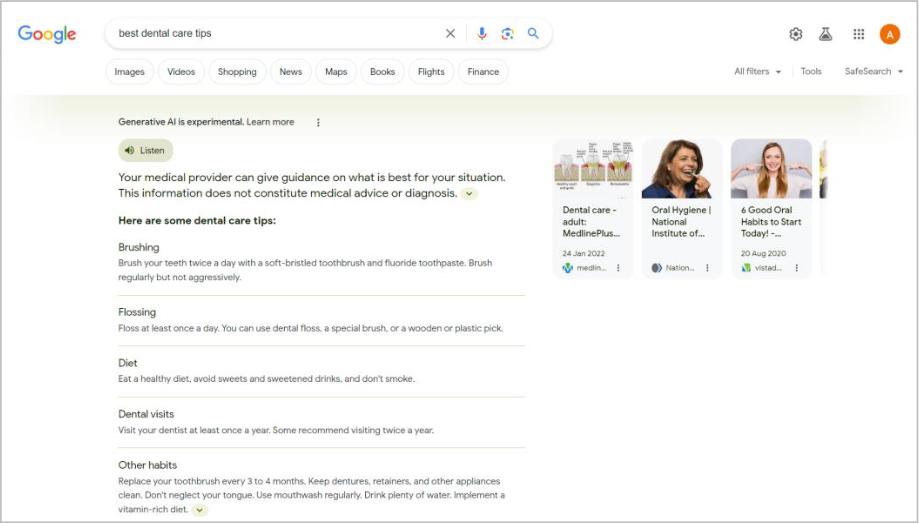
Additionally, users have the option to input their own follow-up questions into the “Ask a follow-up” box.

Just to clarify, this feature is not a chatbot like ChatGPT.
As it becomes increasingly widespread, this feature will likely change how we use the search engine. It will also impact how websites try to get more views and visitors.
And, it’s not merely a concept; businesses are making significant investments in this technology.
In fact, the artificial intelligence market, which drives innovations such as SGE, is currently valued at nearly $100 billion USD and is projected to surge to nearly $2 trillion USD by 2030.
Is it live yet?
While not officially baked in yet, Google’s SGE is experimental is only accessible to limited people in the United States and is currently offered exclusively in English. If you are located in the U.S., you can attempt to activate it while browsing.
Will it affect all search queries?
Google’s Search Generative Experience (SGE) is designed to enhance the search experience by generating more conversational and comprehensive responses to search queries. However, since it is still experimental, whether it affects all search queries depends on various factors such as the nature of the query, the user’s location, the language of the query, and whether Google has rolled out SGE for that particular type of query or in that specific region.
We did our own experiments across different types of search queries and found that this should not affect direct local search queries. Informational queries are likely to be affected.
For example, a search for “Roofing Contractor San Antonio TX” did not bring up SGE result at the top as opposed to “Things to Consider Before Selecting a Roofing Contractor in San Antonio TX”.
Query → Roofing Contractor in San Antonio
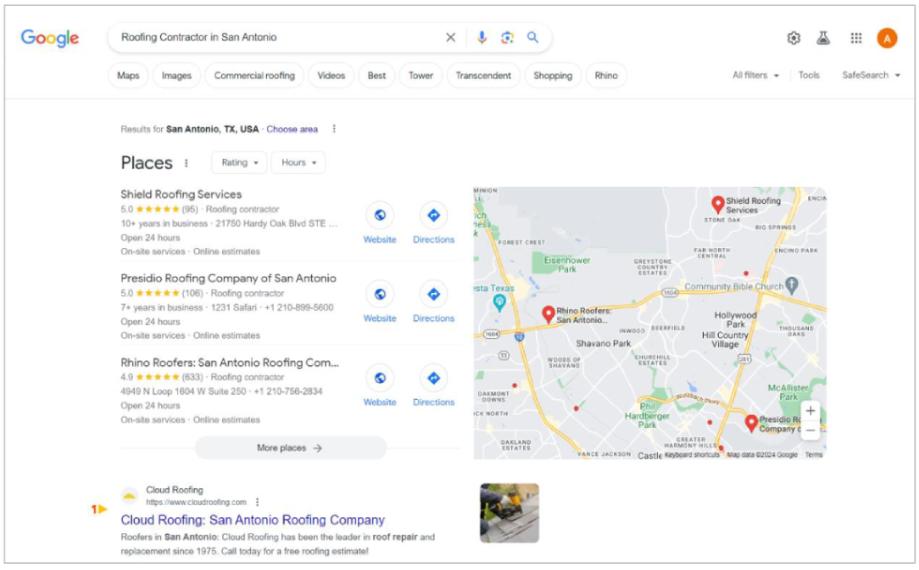
Query → Things to Consider Before Selecting a Roofing Contractor in San Antonio
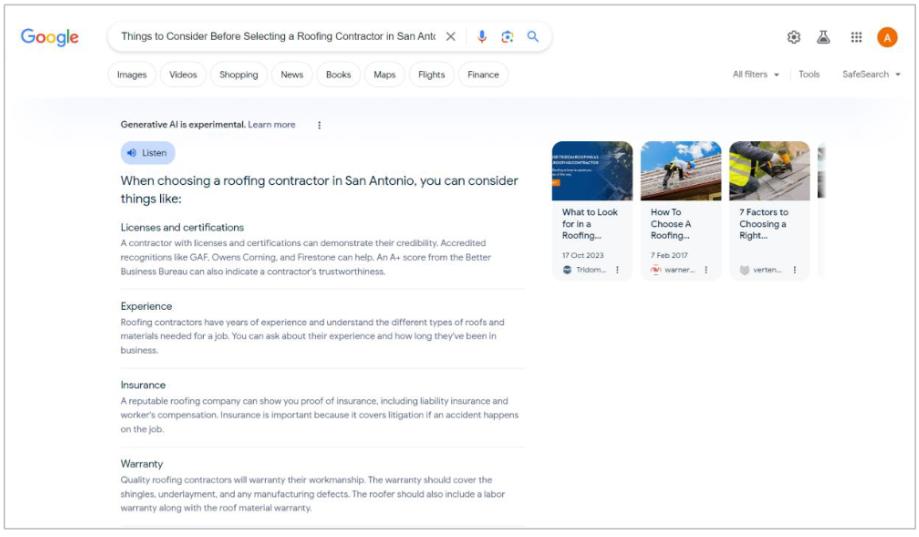
How do you prepare for this change?
It’s still too early to have a foolproof method for optimizing content for Google’s SGE. However, prioritizing content that directly and thoroughly addresses user inquiries can help ensure relevance. This is because the AI-generated results provided by SGE still include links to relevant content and resources alongside the search results.
The exact factors influencing the links appearing alongside the snippet remain unclear. However, based on our research, it’s advisable to focus on content that includes:
- Long tail keywords: These are highly specific queries that often have lower search volumes. An example of long-tail keywords when writing content about Eco Friendly Cleaning in Irvine could be – Eco-friendly cleaning services for homes in Irvine or Green cleaning services in Irvine.
- − Question keywords: These are keywords that begin with question words like “how,” “what,” “why,” “when,” and “where.” Here are some examples of a question keyword – Where can I find eco – conscious cleaners in Irvine? Or Are there any green cleaning companies in Irvine?
- − Conversational keywords: These are keywords that mimic natural conversation and reflect how people speak when using voice search. Examples of a conversational keyword are – Find me a local company specializing in eco-friendly cleaning services in Irvine or Can you tell me about green cleaning options in Irvine?
However, one thing is certain: Don’t discard traditional SEO best practices because of SGE. Even though AI- generated results might influence user behavior, SERPs still feature traditional search results, making them relevant in the future of SEO.
At this point, it’s too early to determine how often users will depend on SGE to answer their queries. Many users may still choose to click through to the traditional search results that continue to be displayed in the SERP.
2. Google Business Profile Websites Shutting Dow
What is this all about?
In a recent announcement, Google revealed that they will shut down Business Profiles websites in March 2024. When a user tries to access these sites, they’ll be automatically redirected to the corresponding Google Business Profile. However, this redirection will only be active until June 10, 2024. Beyond this date, attempting to access the websites will result in a “page not found” error.
Will it affect your business?
If you own a Business Profiles website or your domain ends with .business.site or negocio.site, it’s crucial to act promptly. For instance: https://cdd-construction-roofing-contractor.business.site/
Businesses interested in retaining their own website must create a new site using alternative tools and update their Business Profile with the new site address before the deadline to ensure a seamless transition.
If your Ads campaign is linked to a website from Google Business Profile, either update the link before March 1 to maintain your ads’ functionality or opt to pause your campaigns.
An opportunity for agencies?
As an agency, the announcement of Google shutting down Business Profiles websites presents a unique opportunity for you. You can approach businesses affected by this change and offer them assistance in creating new websites.
Furthermore, by offering SEO or PPC services along with website creation, you can provide comprehensive solutions that address their digital marketing needs.
This proactive approach not only benefits your clients but also serves as a strategic move to boost your agency’s revenue.
3. Schema Markup Implementation
What is schema markup?
Even though it’s not a new method, its importance in local SEO is crucial and shouldn’t be underestimated. Schema markup, also known as structured data, is a specialized code that you integrate into your webpages to assist search engines in comprehending the content of your website more effectively. By incorporating schema markup, you provide search engines with additional context about your content,
which enhances their ability to display your information in a visually appealing and informative format in search engine results pages (SERPs). For example, a search for “best birthday cake recipes” brings up this:
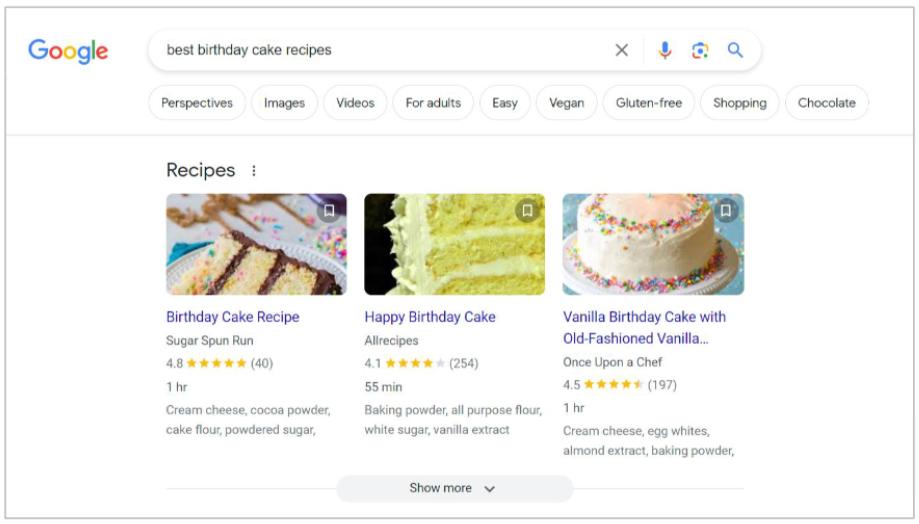
In this instance, Google has showcased an image, star rating, review count, cooking time, and recipe ingredients directly within the search results. These features elevate your webpage above other results, making it more prominent and enticing to users.
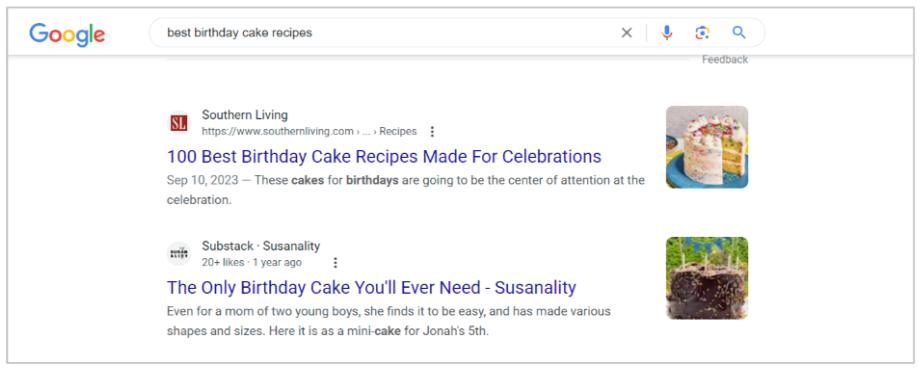
While not every schema update triggers a rich snippet, its value extends beyond this feature. Even without a snippet, schema markup assists search engines in comprehending your content more effectively. This enhanced understanding improves your chances of ranking for relevant keywords, thereby increasing your website’s visibility and relevance in search results.
How does it help?
Schema markup is essential for SEO not primarily because it directly influences your rankings in search results, but due to its other significant advantages.
Firstly, schema markup aids search engines in comprehending the context and content of your webpages more efficiently. This heightened understanding can result in your pages being displayed for more pertinent search queries, leading to increased traffic.
Secondly, schema markup can improve the appearance of your webpage in search results. Consequently, users are more likely to notice and click on your page, thus enhancing your click-through rate (CTR).
Lastly, schema markup can provide you with a competitive advantage. Since many websites are still not utilizing schema markup, implementing it puts you ahead of the competition. This competitive edge makes your website stand out.
Collectively, these benefits contribute to an overall improvement in the SEO performance of your site.
Is it available for all businesses?
There are numerous types of schema markup available for multiple industries. When implementing schema markup on your website, it’s essential to focus only on those that are relevant to your content or applicable to your business. This ensures that the schema markup you use enhances the understanding and visibility of your website in search results, without overwhelming it with unnecessary or irrelevant schema types.
4. Topical Authority
What is topical authority
SEO is evolving to emphasize strategies that showcase expertise in specific topics, known as topical authority.
Search engines, particularly Google, are increasingly valuing content that demonstrates authority, defined by a combination of experience, expertise, authoritativeness, and trustworthiness, often referred to as “E-A-T” (Expertise, Authoritativeness, Trustworthiness).
How does it help?
Establishing topical authority involves positioning oneself as a reliable source of information on a specific subject or niche, ensuring that content comprehensively covers all aspects of the topic. This approach provides an opportunity to surpass competitors and achieve higher rankings in Google search results.
How to implement this content strategy
Establishing topical authority demands a strategic approach to crafting and optimizing content.
This approach entails:
- Creating thorough, authoritative, and top-notch content centered on a particular subject.
- Expanding your content library to cover related topics and subtopics extensively.
- Employing a website structure that facilitates the discovery of relevant interconnected content by both users and search engine crawlers.
For example, a topical strategy for a real estate business in Dallas should include the below topics:
- Pillar Topic: “Real Estate Market in Dallas, Texas”
- Subtopic 1: “Overview of Dallas Neighborhoods”
- Sub-subtopic: “Popular Neighborhoods in Dallas”
- Sub-subtopic: “Affordable Neighborhoods in Dallas”
- Sub-subtopic: “Luxury Neighborhoods in Dallas”
- Subtopic 2: “Buying a Home in Dallas”
- Sub-subtopic: “Home Buying Process in Dallas”
- Sub-subtopic: “Tips for First-Time Homebuyers in Dallas”
- Sub-subtopic: “Financing Options for Homebuyers in Dallas”
- Subtopic 3: “Selling a Home in Dallas”
- Sub-subtopic: “Preparing Your Home for Sale in Dallas”
- Sub-subtopic: “Pricing Strategies for Selling Homes in Dallas”
- Sub-subtopic: “Marketing Your Home in Dallas”
- Subtopic 4: “Real Estate Investment Opportunities in Dallas”
- Sub-subtopic: “Overview of Real Estate Investment in Dallas”
- Sub-subtopic: “Types of Investment Properties in Dallas”
- Sub-subtopic: “Tips for Successful Real Estate Investments in Dallas”
- Subtopic 1: “Overview of Dallas Neighborhoods”
Each subtopic provides detailed information related to the central theme of real estate in Dallas, creating a comprehensive resource for users interested in various aspects of the topic. Additionally, interlinking between the pillar topic and subtopics helps to establish topical authority and improve SEO performance.
5. Optimizing Your Business For Local SEO
The rise of local search
In the constantly changing world of digital marketing, one thing stays the same: the importance of Local SEO. As we enter 2024, local search engine optimization is set to become even more crucial, and it’s not just a passing trend — it’s a game-changer for businesses of every size.
As the world becomes more connected and consumers turn to the internet to discover products and services nearby, mastering Local SEO is no longer a choice. It’s a strategic necessity.
Whether you own a small business or are involved in a larger enterprise, grasping the significant impact of Local SEO is essential for achieving success in the future.
Key components of local SEO
- Google Business Profile Optimization
Optimizing your Google Business Profile is crucial for boosting your online visibility and attracting local customers. With millions of users relying on Google for business searches daily, ensuring your profile is complete, accurate, and regularly updated with photos, posts, FAQs and reviews enhances credibility, trust, and competitiveness. This strategy drives foot traffic, increases website visits, and ultimately contributes to your business’s success in the digital marketplace. - Targeting Local Keywords
Local SEO begins by comprehending the dialect of your nearby audience. Unlock the skill of choosing and refining ‘Local Keywords’ to draw in nearby potential customers to your business. -
Customer Reviews and Ratings
Customer reviews and ratings significantly impact Local SEO by providing social proof, influencing search engine rankings, and offering insights for business improvement. Positive reviews enhance credibility and trust, attracting more local customers. Additionally, search engines prioritize businesses with higher ratings, boosting their visibility in local search results. Moreover, reviews offer valuable feedback, helping businesses refine their products and services to better meet customer needs. Overall, prioritizing customer reviews and ratings is essential for optimizing Local SEO and driving business success. - Content Optimization and Marketing
Content marketing is a strategic method centered on producing and disseminating valuable, pertinent content to captivate and involve a distinct audience. It serves as a potent instrument for establishing brand recognition and stimulating customer interaction.
The objective of content marketing is to establish a profound connection with your target audience by furnishing them with valuable and captivating content tailored to their requirements and preferences.
Advanced strategies for local SEO
- As voice search continues to rise, optimizing for it is essential. With more people using voice-activated devices to find local businesses, focusing on natural language queries and long-tail keywords is key. Creating concise content that answers common voice search questions helps businesses improve visibility and connect with potential customers more effectively.
- Utilize video marketing to boost your local SEO. Create high-quality videos showcasing your offerings, expertise, and local presence. Optimize video titles, descriptions, and tags with relevant local keywords for maximum visibility. This approach attracts local audiences and enhances search engine rankings, driving more traffic and potential customers to your business.
- Use AI to create high-quality, keyword-rich content efficiently, ensuring a natural and engaging tone that resonates with your audience. By integrating AI into your content strategy, you improve efficiency while maintaining authenticity and relevance, driving better business results.
- Prioritize mobile optimization to align with Google’s mobile-first indexing. Enhance mobile page speed, design, and user experience to improve search rankings and provide a seamless browsing experience for mobile users, boosting engagement and conversions.
- Use structured data markup to provide search engines with key details about your business, such as hours of operation, reviews, and location data. This improves visibility and helps display rich snippets in search results.
- An FAQ page with Schema markup on your website is crucial for providing quick answers to common queries, improving user experience, boosting SEO, and building trust with visitors.
- Invest in targeted paid advertising (as a component to SEO) to reach local audiences effectively. Google Ads offers precise targeting options based on location and demographics. By creating location-specific ad campaigns, you can enhance visibility and attract potential customers in your area.
